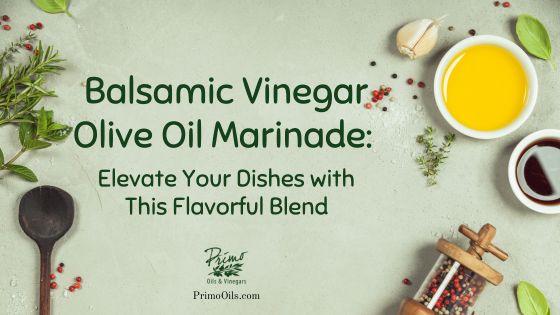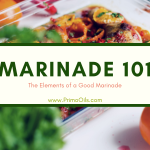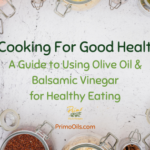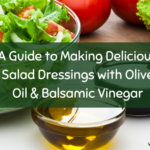A balsamic vinegar and olive oil marinade is a classic preparation that brings a rich, tangy flavor to a variety of dishes. A staple in many kitchens, this marinade combines the deep sweetness and slight acidity of balsamic vinegar with the smooth, fruity flavor of olive oil. Here at Primo Oils, we use this dynamic duo not only for its taste but also for its ability to tenderize and enhance the natural flavors of meats and vegetables.
Creating the perfect balsamic vinegar olive oil marinade is both an art and a science. By understanding the properties of these ingredients, we are able to harmonize flavors to suit our personal taste preferences. Whether marinating chicken for a savory roast or vegetables to grill, the versatility of a balsamic olive oil marinade makes it an essential component in our culinary toolkit.
Key Takeaways
- A balsamic vinegar and olive oil marinade is essential for enhancing flavor & tenderness.
- The quality of ingredients influences the overall taste of the marinade.
- Balsamic vinegar and olive oil marinades are versatile and can be stored for future use.
History of Balsamic Vinegar and Olive Oil
Balsamic vinegar’s origins can be traced to the Modena and Reggio Emilia regions of Italy. Its development dates all the way back to the Middle Ages. Nobles cherished this vinegar and frequently used it as a disinfectant or a digestive aid. Learn about its history, where the traditional aging process often took place in wooden barrels, enhancing the vinegar’s flavor complexity over time.
Olive oil, on the other hand, has been a staple in Mediterranean cultures for millennia. Around 6000 BCE, its production began in the Eastern Mediterranean region. The olives were typically handpicked and then pressed to extract the oil. Olive oil was the great catch all – from being an essential food ingredient to serving as fuel for lamps and anointing rituals in ancient cultures.
| Era | Balsamic Vinegar | Olive Oil |
| Ancient | Used by nobles in Italy | Began in the Eastern Mediterranean |
| Medieval | Acclaimed for its health benefits | Integral to Mediterranean diet |
In our culinary practices today, we blend these two ancient ingredients to create a marinade that not only flavors and tenderizes meat but also carries centuries of rich history. As we marinate our steaks or drizzle this mixture over salads, we’re partaking in a tradition that spans back to ancient civilizations. So give yourself a pat on the back for your rich and storied cooking.
Selecting Quality Ingredients
When we’re creating the perfect balsamic vinegar olive oil marinade, the quality of the ingredients we choose is crucial. The right olive oil and balsamic vinegar can make the difference between a decent marinade and the best one you’ve ever tasted. This is where we at Primo can help make your decision process easier. Every balsamic vinegar and olive oil that we sell has been rigorously tested for quality.
Choosing the Right Olive Oil
For an indulgent marinade, we opt for extra virgin olive oil due to its rich taste and high levels of beneficial antioxidants. The region of origin can significantly affect the flavor; for instance, Italian or Greek oils often offer a fruity note, perfect for both dipping and dressing.
When you visit Primo Oils we are happy to take you on a taste test of EVOO from all over the world; from Spain to Italy, Australia to Greece we’ve brought the best olive oils from the world over to our shop here in Louisville. We ensure our selection is labeled as “cold-pressed,” which indicates that the oil was extracted without heat to preserve its flavor and nutritional value.
Identifying Premium Balsamic Vinegar
A premium balsamic vinegar is aged and carries a balance of sweet and tangy flavors that enrich our marinade. We look for balsamic vinegar that has been aged for at least 12 years—Ideally from Modena or Reggio Emilia, Italy, which are renowned for their balsamic vinegar. The label should indicate “Aceto Balsamico Tradizionale” to guarantee we’re getting the authentic, quality product needed for our dipping delight. We also carry a variety of flavored balsamic vinegars so you have an unending supply of gourmet flavors to choose from.
Creating Your Marinade
Welcome to our friendly guide on creating the perfect balsamic vinegar olive oil marinade. Our focus will be on achieving a balance of flavors, methods for blending ingredients, and optimizing marination time to ensure that your meats, vegetables, or dipping oils and vinegars reach their full potential in both taste and texture.
Mixing Ratios and Techniques
To start, we’ll need a foundation of quality extra-virgin olive oil and balsamic vinegar. The typical ratio we use is a three-to-one blend, ensuring that neither the olive oil’s smoothness nor the balsamic’s tangy kick overwhelms the other.
- Olive Oil: ¾ cup
- Balsamic Vinegar: ¼ cup
Whisk these two together until they emulsify. For those looking to create a memorable marinade for a top sirloin steak recipe, this simple technique is a great starting point.
Flavor Enhancements
Now, we jazz things up. Depending on what we’re marinating, we add aromatic enhancements to our base:
- Minced Garlic: 2 cloves
- Italian Seasoning: 1 tablespoon
Each of these add-ins offers a layer of complexity. Garlic introduces a punchy depth, and the herbs contribute a fragrant bouquet. If we decide to create a marinade for dipping oils and vinegars, we might infuse additional spices or citrus zest for a brighter note.
Marination Timeframes
And finally, time is of the essence. We let our concoction work its magic on the chosen food for as long as needed.
- Minimum: 1 hour
- Optimum: 6-8 hours
For the best results, refrain from marinating beyond 24 hours, especially for delicate items such as fish, to prevent the fibers from breaking down too much. Our tip for a balanced marination experience is to always store your marinating delights in the refrigerator, and then let them come to room temperature before cooking, which can enhance the overall flavor profile.
Versatile Uses of Balsamic Vinegar Olive Oil Marinade
A balsamic vinegar and olive oil marinade isn’t just for marinating; its flavorful profile makes it perfect for an array of culinary applications. Let’s explore how we can use it to enhance our dishes.
As a Dressing
When we’re aiming for a quick and nutritious salad, a marinade can double as a delightful dressing. The richness of olive oil paired with the tangy depth of balsamic vinegar creates a balanced dressing suited for a variety of greens. Try whisking together equal parts of olive oil and balsamic vinegar with a dash of herbs for a simple, yet delicious salad addition. Then mix it up by selecting one of our flavored varietals. You’ll never get tired of your dressing with the infused olive oils, dark and white balsamic vinegars available at Primo Oils.
- Ingredients for Balsamic Dressing:
- Olive oil
- Balsamic vinegar
- Optional: garlic, mustard, honey
For Dipping
Next time you host a gathering, delight your guests with an irresistible dipping sauce. Pour your balsamic vinegar olive oil marinade into a shallow dish and serve it with crusty bread for an appetizer that everyone will enjoy. The subtle flavors of the olive oil are elevated by the balsamic’s slight acidity, making it an instant hit.
- Ingredients for Dipping:
- Superior quality olive oil
- Aged balsamic vinegar
- Optional: crushed pepper, Parmesan cheese
In Cooking
Our marinade serves as a magnificent addition to various cooking methods. It’s perfect for adding a splash of flavor to roasted vegetables or as a basting liquid for grilled meats. The olive oil ensures dishes remain moist, while the balsamic vinegar imparts a sweet and tangy glaze.
- Cooking Applications:
- Roasting: vegetables, potatoes
- Grilling: chicken, steak, fish
- Sautéing: mushrooms, greens
Storing and Preserving Your Marinade
When we make a marinade with balsamic vinegar and olive oil, our goal is to boost the flavor of our dishes. Proper storage and preservation are key to maintaining the marinade’s quality. Here’s how we can keep it fresh:
- Refrigeration: It’s essential to refrigerate the marinade promptly. This helps inhibit bacterial growth and keeps the marinade safe to use. We recommend storing it in an airtight container or a sealed bag to maintain its freshness.
| Temperature | Shelf Life |
| Below 40°F (4°C) | Up to 5 days |
Containers: For your marinade, glass or food-grade plastic containers are ideal. Ensure they’re clean to prevent any contaminations.- Glass: Non-reactive and preserves flavor well.
- Plastic: Convenient but might absorb odors. Use one specifically for marinades if possible.
- Labeling: We like to label our containers with the date to track how long the marinade has been stored. This is a simple step that helps avoid using a marinade that’s been sitting for too long.
- Freezing: If you’ve made a large batch, freeze the extra marinade. Just pour it into ice cube trays for easy use later. Once frozen, transfer the cubes into a freezer bag, label it, and use within three months for the best quality.
| Storage Method | Shelf Life |
| Freezing | Up to 3 months |
Keep in mind, to always give your marinade a good stir or shake before using it.
Food Safety Tip: If you’ve marinated meat and have leftovers, discard the extra rather than trying to store it. Even if your marinade has been in the fridge the whole time it is no longer usable due to it’s contact with raw meat.
Frequently Asked Questions
In this section, we’ll answer some of the common questions you might have about creating the perfect balsamic vinegar and olive oil marinade. Have another? Feel free to reach out to us here at Primo. We love talking about food, it’s literally our job!
What is the best ratio of olive oil to balsamic vinegar for a flavorful marinade?
We’ve found that a good starting point for a marinade is a 3:1 ratio of olive oil to balsamic vinegar. This blend offers a balanced flavor where the rich, fruity taste of the olive oil complements the tangy sweetness of the balsamic vinegar.
How long should chicken be marinated in a mixture of balsamic vinegar and olive oil?
Ideally, chicken should be marinated for at least 30 minutes, but for an even richer flavor, we suggest a couple of hours. Don’t marinate for more than 24 hours though, as the acidity of the vinegar could start to break down the meat excessively.
Can a balsamic and olive oil marinade help tenderize beef, and if so, how?
Yes, it can. The acidity in balsamic vinegar works as a tenderizing agent for beef. Marinating beef for about 4 to 6 hours in our balsamic and olive oil mixture will help to tenderize it, while also infusing aromatic flavors.
What are some tasty additions to a balsamic vinegar and olive oil marinade for pork?
For a delicious pork marinade, consider blending in a bit of Dijon mustard or honey for sweetness, and minced garlic or chopped fresh rosemary or sage for a robust flavor profile.
Is it possible to use balsamic vinegar and olive oil as a marinade for grilling vegetables?
Certainly! Marinating vegetables in balsamic vinegar and olive oil imparts a savory glaze that caramelizes wonderfully on the grill. We recommend marinating for at least 20 minutes before grilling.
What herbs and spices pair well with a honey balsamic and olive oil marinade for chicken?
Rosemary, thyme, and oregano marry well with honey balsamic and olive oil when it comes to chicken. Adding a spoonful of honey to the marinade can enhance the natural flavors and add a mild sweetness that pairs well with these spices.






